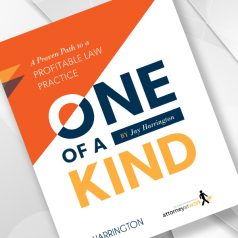When building a law practice, don’t try to serve everyone. Establish a niche practice and focus on serving someone.
I started a small law firm in Detroit in 2009 with a friend of mine. I had six years of legal experience at that point, and no clients to speak of.
I was betting there would be so much corporate restructuring work (my practice specialty) that business would simply arrive once I hung a shingle.
Things didn’t work out as planned. Work, which was plentiful, didn’t magically appear on my desk. While I was thinking big about the potential opportunities, I realized I needed to act small to capitalize on them.
Instead of pursuing work from tier 1 or 2 auto suppliers, which were largely out of reach, I focused on an overlooked and underserved segment of the supply chain: auto dealers.
To get in front of dealers, I got in touch with the local auto dealers association. I wrote, spoke, and had lots of conversations — for free. By immersing myself in the dealer world, and providing insights and information, I established relationships that led to new business. Dealers are a tight-knit group, so referrals started pouring in.
It was the boost I needed to launch my practice. It resulted from having a narrow focus, a niche.
My experience is not unique. Focusing on a narrow niche is the foothold that many lawyers use to gain traction. If you’re struggling to gain traction, keep this in mind: When building a practice, don’t try to serve everyone. Focus on serving someone. Others will follow.
The Benefits of Having a Niche Practice
Many lawyers fear that a narrow focus will limit opportunities. This is scarcity thinking.
Even the seemingly smallest markets offer big opportunities. Litigation for auto dealers in Detroit, corporate work for dentists in Chicago, and estate planning work for young families in Charlotte are all multimillion-dollar niche opportunities.
It’s easy to be seduced by the idea that bigger is better, but an inch-deep, mile-wide approach to business development almost never works. You need to start somewhere, and the best place to start is identifying, in the words of Seth Godin, a minimum viable market. Again, think big but act small.
As you become a well-known expert in a niche, you’ll create a flywheel effect of referrals. The tight-knit group you serve will talk you up. Once you dominate one small market, it’s far easier to move into new ones. In this sense, a narrow niche is what allows you to scale your practice to new heights.
Need more convincing of the power of a niche?
Consider that a narrow focus:
- Allows you to become a recognized thought leader. When you have a niche, you deal with the same types of clients facing similar issues over and over. This allows you to spot patterns and connect dots in your thought leadership content in a way that’s not possible if you’re a generalist. Your content becomes more resonant because it’s written for your ideal client, not everyone.
- Makes marketing easier. When you’re focused on a particular niche market, you can identify the key publications, websites, trade groups and conferences your market cares about. You can then inject yourself into the conversation happening within that market.
- Is less stressful because you know the basics (the procedures, the statutes) cold. There’s no getting up to speed. As a result, you can take on the tough (expensive) problems and craft more creative solutions.
- Gives you more pricing power. Every attorney-client relationship involves a struggle for control. Established expertise is what tips the scales toward you. When you’re no longer seen as a commodity, you can charge above-market rates. It’s true: The riches are in the niches. Clients pay for expertise.
- Allows you to reduce the cost of sale. There is less pitching, and no more RFPs when you’re dominant in a niche because you’re perceived as the go-to expert. When it really matters, clients seek you out.
- Enables you to expand the geographic scope of your practice. With a niche, you’re no longer forced to hunt for clients within a small geographic radius. Expertise travels.
This sort of strategy isn’t for everyone. It’s certainly not the only way to build a practice. But if you’re looking for a way to build some momentum, a less-is-more approach may be the thing that gets your practice rolling.
Illustration ©iStockPhoto.com


















